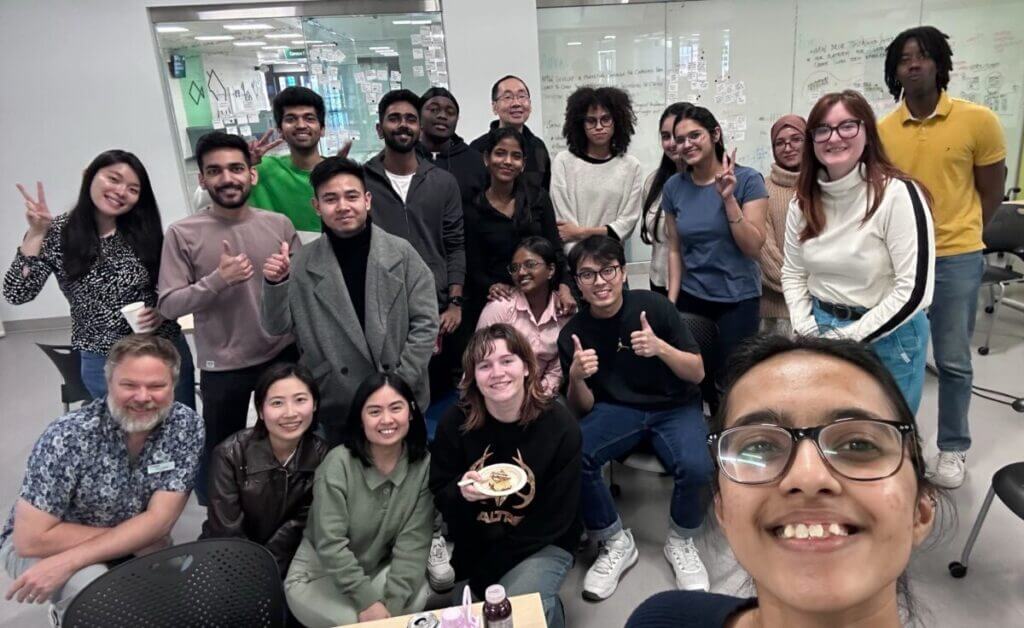CICan National Skills for Success Hackathon focuses on collaboration, innovation
Posted on Thursday, April 3rd, 2025
Algonquin College students and alumni recently participated in the Colleges & Institutes Canada (CICan) National Skills for Success Student Hackathon, where multi-disciplinary teams collaborated to develop innovative solutions for a collective challenge. Held over March 22-23, 2025, the event brought together students and recent graduates from 16 post-secondary institutions across Canada to learn about the Skills for Success (SFS) Program, a Government of Canada initiative which provides training, resources and funding for Canadians to develop workplace skills to advance their careers. Students then explored design solutions for the SFS Online Tool – an interactive assessment which helps job seekers identify resume gaps, industry trends and upskilling opportunities at CICan member institutions.
Participants were grouped based on the diversity of their skills and program of study, then joined in a series of activities aimed to explore and expand the SFS Online Tool, a prototype application developed by CICan that provides career seekers the opportunity to explore job paths and receive personalized career recommendations based on their skills. The hackathon provided teams the opportunity to audit the user experience, leverage industry data, integrate artificial intelligence, examine accessibility needs and increase reach for underrepresented communities. To address these challenges, teams selected from design prompts to frame the strategic direction of their project.
Loveleen Kaur, a participant and recent graduate of the Business Management and Entrepreneurship program, recognized how the diverse skillset of her team served as an advantage to project development.
“Many participants were from the Human-Centred Design program and have a background in user experience. So, I had to explain the marketing aspect to my teammates and they explained the user experience to me. We had something to learn from each other,” she said.
Teams were led by a student facilitator who guided them through the hackathon. One facilitator, Pragya Gouti – a learner in Interdisciplinary Studies in Human-Centred Design – was excited to build on her previous workshop experience and connect with peers from different areas of study, both at the College and across the country.
“The Algonquin students were together in-person in one place, but we were connected with other schools via Teams and communicating with them using video conferencing,” said Gouti. “There were around 200 participants in the hackathon doing research, understanding the design challenge, thinking and working on the activities.”
Gouti drew on her student experience when overseeing her team and helping them throughout the hackathon, particularly from her classes with Jed Looker, Principal Investigator of the Human-Centred Design Lab and hackathon playbook facilitator.
“The main thing I had in my mind was how Jed teaches us in the classroom,” she said. “He helps us to understand the concept…it’s what I thought about while I was facilitating my team.”
At the end of the second day the teams presented their findings to a virtual panel of judges, industry professionals from the technology, aviation, online learning, health care and post-secondary sectors. Afterwards, students had the opportunity to connect with the judges and form valuable industry connections.
“All the projects were amazing. It was actually quite hard on the judges as the quality of the outcomes was very strong, seeing how teams only had several hours to pull their ideas together,” said Looker. Participants came away from the hackathon with a renewed appreciation for how open communication and understanding others’ viewpoints is the foundation for effective teamwork.
“One of my takeaways was that when working in teams, you can’t move forward and leave anyone on the team behind or the whole team is behind,” said Kaur. “Also, you have to share knowledge. If you know one thing and they know another, you teach them your one thing and they teach you theirs.”
